TSG101
-
Official Full Name
tumor susceptibility 101 -
Overview
The protein encoded by this gene belongs to a group of apparently inactive homologs of ubiquitin-conjugating enzymes. The gene product contains a coiled-coil domain that interacts with stathmin, a cytosolic phosphoprotein implicated in tumorigenesis. The protein may play a role in cell growth and differentiation and act as a negative growth regulator. In vitro steady-state expression of this tumor susceptibility gene appears to be important for maintenance of genomic stability and cell cycle regulation. Mutations and alternative splicing in this gene occur in high frequency in breast cancer and suggest that defects occur during breast cancer tumorigenesis and/or progression. [provided by RefSeq, Jul 2008] -
Synonyms
TSG101;tumor susceptibility 101;TSG10;VPS23;tumor susceptibility gene 101 protein;tumor susceptibility gene 10;tumor susceptibility protein;tumor susceptibility gene 101;ESCRT-I complex subunit TSG101
Recombinant Proteins
- Human
- Chicken
- Rhesus macaque
- Rat
- Wheat Germ
- E.coli
- Mammalian Cells
- Sf9 Cells
- HEK293
- In Vitro Cell Free System
- GST
- His
- Myc
- SUMO
- Flag
- Non
- Avi
- Fc
Background
What is TSG101 Protein?
TSG101 is a busy protein that helps cells do a lot of important stuff. It helps sort proteins into little packages called multivesicular bodies, which can either break them down or send them out of the cell. It's also really important for viruses like HIV, where it helps the virus break free from the cell. In cancer research, TSG101 helps control the cell cycle and fix DNA. When it doesn't work right, it can lead to tumors growing and spreading. Because it's involved in so many different things, TSG101 is a big deal in virus research, cancer studies, and understanding how cells work.What is the Function of TSG101 Protein?
TSG101 is this really busy protein that helps cells with a bunch of important tasks. It helps sort proteins into little packages for recycling or shipping out of the cell. It also plays a big role in how viruses like HIV break free from cells. In cancer, TSG101 helps control the cell cycle and fix DNA, but when it goes wrong, it can lead to tumors growing and spreading. Because it does so many different things, TSG101 is a big deal in virus research, cancer studies, and understanding how cells work.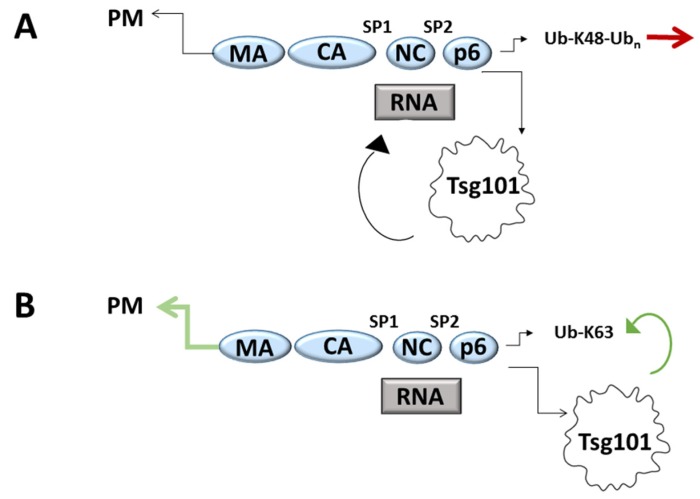
Fig1. Model: tRNA binding controls Tsg101 recruitment and recruitment of Ub-modified Gag. (Susan M Watanabe, 2020)
TSG101 Related Signaling Pathway
TSG101 is a crucial protein that impacts several key processes in cells. It’s involved in sorting proteins into multivesicular bodies, which is important for things like breaking down receptors and forming exosomes. In viral infections, TSG101 helps viruses like HIV release particles by interacting with viral proteins. It also plays a role in the cell cycle and DNA repair, so when it doesn't work right, it can lead to cancer. Because of its wide-ranging roles, TSG101 is a major target for both cancer research and developing new treatments.TSG101 Related Diseases
TSG101 is linked to a range of health issues, from cancer to viral infections and brain disorders. In cancer, especially glioma, TSG101 can drive tumor growth and spread through key pathways. It also helps viruses like HIV release particles. In the brain, its overactivity in neural stem cells boosts exosome release, which can protect against damage from strokes. Because it touches so many areas, TSG101 is a big deal in cancer studies, virus research, and brain health.Bioapplications of TSG101
TSG101 is a protein that shows up in a bunch of different areas, especially when it comes to cancer, viruses, and exosomes. In cancer, it’s a big deal because it can tell us how bad a tumor might get and how fast it could spread. It’s also super important for exosome research—those are tiny packages that cells use to talk to each other and could be used to deliver treatments. And in viruses, like HIV, TSG101 helps the virus break free from cells. All these roles make TSG101 really important for figuring out diseases and finding new treatments.Case Study
Case Study 1: Itakura Y. et al. J Virol. 2023
Viruses need to assemble their proteins and bud off from cells to make new virus particles. Some viruses, like rabies, use a host cell's machinery called ESCRT to help with this. Rabies virus has a unique bullet shape, but we don't fully understand how it forms. In our study, we found that a protein called TSG101 helps rabies virus spread. The virus's matrix protein interacts with TSG101 through specific motifs. Without this interaction, the virus can't assemble properly and loses its bullet shape. This shows how important TSG101 is for rabies virus budding and shape.-
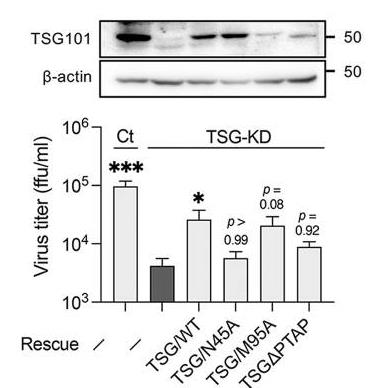 Fig1. TSG-KD cells were transfected with siRNA-resistant TSG101-encoding plasmids and infected with RABV at an MOI of 1.
Fig1. TSG-KD cells were transfected with siRNA-resistant TSG101-encoding plasmids and infected with RABV at an MOI of 1. -
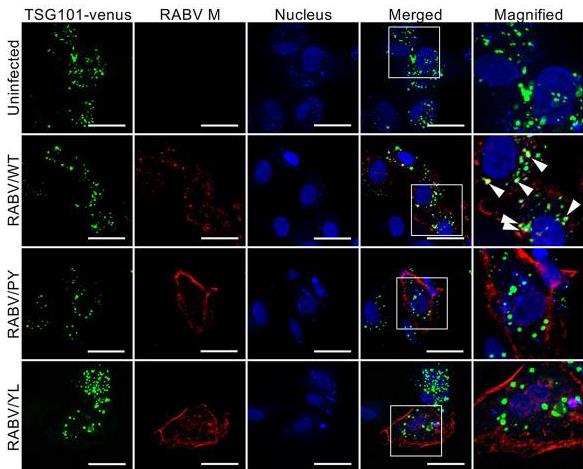 Fig2. Colocalization of RABV M and TSG101.
Fig2. Colocalization of RABV M and TSG101.
Case Study 2: Zhu Y. et al. Mol Neurobiol. 2021
TSG101 is a gene that’s been tied to cancers like pancreatic, prostate, and liver, but its role in brain tumors, or gliomas, isn’t totally clear yet. This study looked at TSG101 in glioma patients and found it cranked up in tumor tissues, especially in the more aggressive ones. When TSG101 was turned down, the cancer cells didn’t grow or spread as much. But when it was turned up, they did. The study also pointed to two signaling pathways that TSG101 uses to do its thing: AKT/GSK3β/β-catenin and RhoC/Cofilin.-
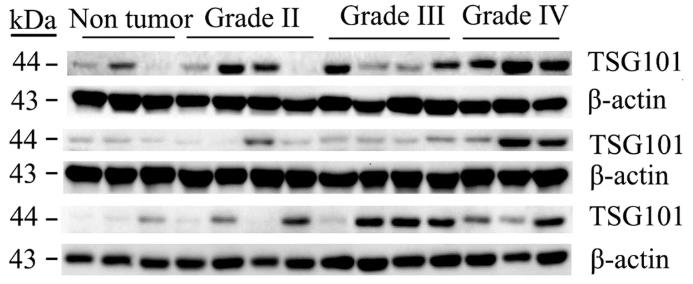 Fig3. Representative images of TSG101 from non-tumorous brain tissues and human gliomas determined by western blot.
Fig3. Representative images of TSG101 from non-tumorous brain tissues and human gliomas determined by western blot. -
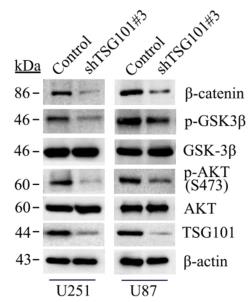 Fig4. TSG101 regulates AKT/GSK3β/β-catenin pathway.
Fig4. TSG101 regulates AKT/GSK3β/β-catenin pathway.
Quality Guarantee
High Purity
-
.jpg) Fig1. SDS-PAGE (TSG101-346H)
Fig1. SDS-PAGE (TSG101-346H) -
.jpg) Fig2. SDS-PAGE (TSG101-6513H)
Fig2. SDS-PAGE (TSG101-6513H)
Involved Pathway
TSG101 involved in several pathways and played different roles in them. We selected most pathways TSG101 participated on our site, such as Endocytosis, which may be useful for your reference. Also, other proteins which involved in the same pathway with TSG101 were listed below. Creative BioMart supplied nearly all the proteins listed, you can search them on our site.
| Pathway Name | Pathway Related Protein |
|---|---|
| Endocytosis | PRKCI,BF1,VPS29,HLA-A,SPG20,ARPC1B,VPS37B,FAM21C,SNX1,VPS37C |
-
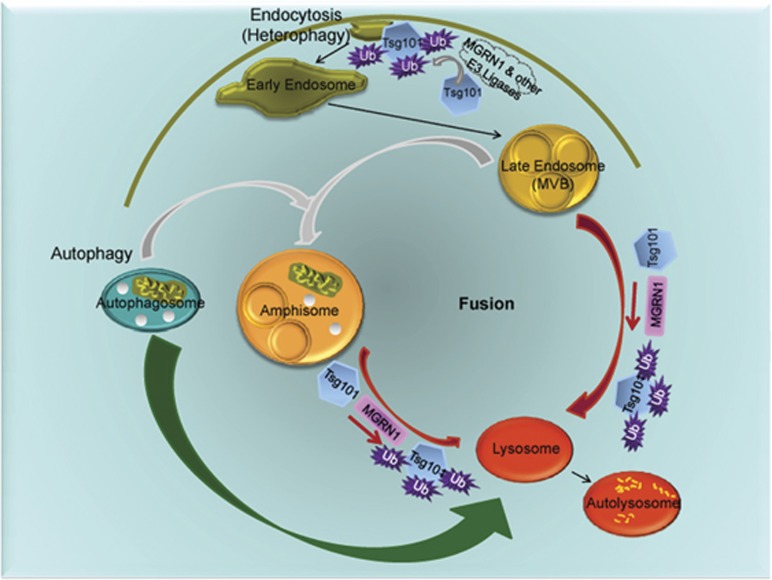 Fig1. MGRN1-mediated multimonoubiquitination of TSG101 governs fusion between lysosomes and amphisosomes/late endosomes. (P Majumder, 2015)
Fig1. MGRN1-mediated multimonoubiquitination of TSG101 governs fusion between lysosomes and amphisosomes/late endosomes. (P Majumder, 2015) -
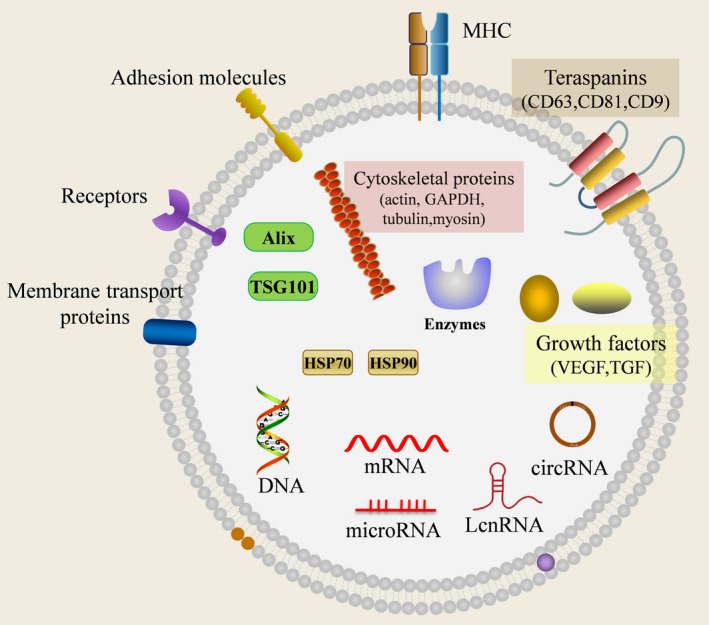 Fig2. Schematic diagram and molecular composition of exosomes. (Zhen Sun, 2018)
Fig2. Schematic diagram and molecular composition of exosomes. (Zhen Sun, 2018)
Protein Function
TSG101 has several biochemical functions, for example, DNA binding,calcium-dependent protein binding,ligand-dependent nuclear receptor transcription coactivator activity. Some of the functions are cooperated with other proteins, some of the functions could acted by TSG101 itself. We selected most functions TSG101 had, and list some proteins which have the same functions with TSG101. You can find most of the proteins on our site.
| Function | Related Protein |
|---|---|
| virion binding | HSP90B1,APCS,PTX3,PVRL1,PPIA,CLEC4M,HIPK2,CD209 |
| transcription corepressor activity | NR2F2,HDAC4,ZNF593,AES,NEUROD2,DDIT3,C1QBP,TLE4,AEBP2,MYBBP1A |
| ligand-dependent nuclear receptor transcription coactivator activity | SMARCD3,ZCCHC18,BUD31,DCAF6,SFR1,HELZ2,PPARGC1B,PPARG,USP22,FGF2 |
| protein binding | ZMAT2,ZFPM2A,C5orf13,RTN4A,LMO2,FAM103A1,DACT1,EMID2,FRMD6,HSPA2 |
| ubiquitin protein ligase binding | PER3,BAG4,MAGEA2B,AXIN1,FHIT,MOAP1,UBE2KA,GABARAP,RELA,GPI |
| calcium-dependent protein binding | CALM3,S100B,KCNIP3,KOP,ANXA6,SYT1,CHP,ANXA3,C9orf9,TNNI3 |
| DNA binding | RCAN1,DNASE1L1,TOX3,ELF2B,GFI1B,AHRRA,ASH1L,TFIP11,ZNF654,ZNF468 |
| protein homodimerization activity | SNRPC,TESCA,PDCD10,BMPR1A,BST2,APOA2,Defa-rs7,VIL1,HEXB,QPRT |
| ubiquitin binding | OTUB1B,USP25,BRAP,USP16,CRY1,VPS28,NUP62,NPLOC4,D17WSU92E,NEDD4 |
Interacting Protein
TSG101 has direct interactions with proteins and molecules. Those interactions were detected by several methods such as yeast two hybrid, co-IP, pull-down and so on. We selected proteins and molecules interacted with TSG101 here. Most of them are supplied by our site. Hope this information will be useful for your research of TSG101.
CEP55;VPS28;LRSAM1
Resources
Related Services
Related Products
References


